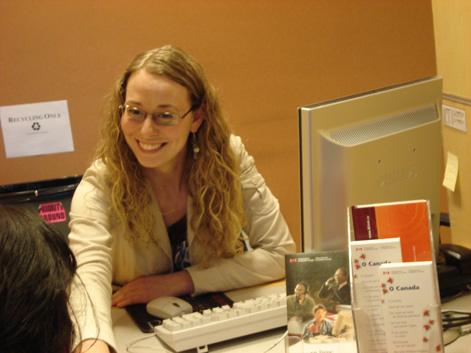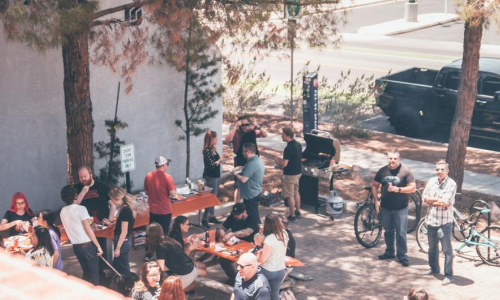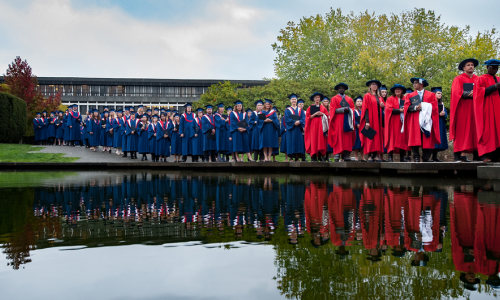
Suzanne Young was recently awarded a Bachelor of Arts degree for her double extended minors in Linguistics and French, and received Co-operative Education designation for completing five Co-op work terms. She also received French and Spanish Language Proficiency Certificates and a TESL Linguistics Certificate. Upon entering SFU, Suzanne was lured by the possibility of studying abroad in a Spanish speaking country, which was offered by SFU International. In her third year, she went to Mexico for one semester, studying entirely in Spanish at Universidad de las Amricas, Puebla. While there, she noticed many students knew what they wanted to do upon graduation since they were required to complete and present a thesis in order to graduate. It was then that Suzanne decided to enter the Co-op program, as she felt it would give her practical experience to complement her degree.
By participating in the Co-op program, Suzanne had opportunities to work in three very dynamic settings which helped her gain skills and experiences along the way. Co-op provides valuable experience which leads you to pick up hands-on skills, said Suzanne. For her terms, she worked for the Department of Foreign Affairs and International Trade Canada (DFAIT) for eight months, the TD Great Canadian Shoreline Cleanup (GCSC) at the Vancouver Aquarium for five months, and the Department of Citizenship and Immigration Canada (CIC) for seven months.
At DFAIT, Suzanne worked in Ottawa as an Information Officer for the Youth Mobility and Academic Exchanges for Europe Unit. There, she worked on reciprocal agreements with other Western European countries, maintained a DFAIT website on Youth Mobility, informed post-secondary schools of recent Youth Mobility opportunities via e-newsletter , and responded to public inquiries among other tasks. She also produced a 30-page training manual on Youth Mobility, as well as took the lead on recruiting a Co-op student to take her place. I can also call myself a true Canadian, because I lived through winter in Ottawa! she recalls, jokingly.
At the Vancouver Aquarium, Suzanne worked for the TD Great Canadian Shoreline Cleanup (GCSC) as an Outreach Assistant. The GCSC is a massive direct-action conservation initiative which takes place the third week of September each year. Last year it took place from September 17th to 23rd, 2007. Over 50,000 Canadians participated by going to any local shoreline to pick up litter which could have otherwise been harmful to wildlife and the environment. In all, 87, 000kg of litter and recycling was collected from all across Canada, she explains. Once all the statistics received from the participants were tallied, they were forwarded to the International Coastal Cleanup (ICC) to tabulate world totals. Last year, approximately 90 countries participated!
Suzanne worked within a team of seven (five in Vancouver, two in Toronto), to organize the Canada-wide event five months beforehand. Her tasks included working with local and national bodies to implement recruitment strategies, creating and editing content for the organizations website, and recording mentions of the GCSC in the media. Since she was the only French-speaking member of the team, she collaborated with a representative from Quebec to create francophone recruitment strategies. On the day of the Vancouver cleanup at Kitsilano Beach, Suzanne was the spokesperson for both French and English-speaking media.
At CIC, Suzanne worked as a Citizenship and Immigration Services Assistant for the Client Services Unit (CSU). Here, she provided information for clients regarding immigration inquiries and concerns, along with answering questions about application submissions and keeping track of clients documents. One project which she had the pleasure of working on with some co-workers was standardizing the hiring procedures for interpreters by creating a project plan, and updating the existing Interpreter Handbook.
Aside from subject-specific skills, Suzanne felt that general skills which students acquire from university can be very helpful on the job. Formatting projects and reports are self-taught skills during university, and these can be very useful in the workplace, she mentions. For Suzanne, the most valuable benefit from participating in Co-op was the opportunity to see and be a part of different job sectors, public, private (in previous positions) and non-governmental (NGO). Its rare to be able to experience each aspect of this range, she adds.
Suzanne is also glad to have taken part in the Co-op program, as she did not need to worry about finding a job after convocating. Once I crossed the stage at convocation, I knew I had a job waiting for me, she says, and I couldnt have done it without the support of the Co-op Coordinators.
Suzanne continues to work for CIC. At the end of June, she will be taking a well-deserved vacation to Spain for some flamenco dancing lessons.














